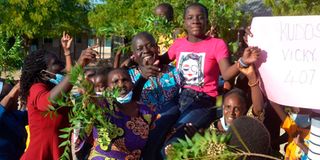Schools need information to give students better career guidelines

Valentine Nafula Wamalwa, 14, who topped in the 2020 KCPE in Turkana County with 412 marks, is celebrated by teachers, parents and schoolmates.
Education Cabinet Secretary George Magoha has recommended 27 teachers for disciplinary action for promoting or abetting cheating in the 2020 Kenya Certificate of Education (KCPE) and Kenya Certificate of Secondary Education (KCSE) examinations. That was a blot in the successful administration of the national exams amid the Covid-19 pandemic.
This is a very serious matter, especially coming at a time when the new Competency-Based Curriculum (CBC) has just been launched. Students will be assessed through a continuous process, unlike currently. Hence, teachers will be expected to be objective in awarding marks to students, which will determine not only their promotion to the next level but also career pathways.
That we still have teachers and principals that involve themselves in irregularities during exams implies that we could have a serious credibility gap from CBC assessments if those involved in irregularities are not weeded out of the system immediately.
Foundation of education
Primary school education is the foundation of education, secondary education the level of consolidation of competencies and university education the level at which students specialise in a chosen area of study.
It is towards the end of the secondary school cycle that students, teachers and parents would seriously discuss and guide students about their careers as their competencies will have been consolidated. However, at the release of the KCPE results every year, the best performing candidates appear to have made up their mind about their career paths.
It would appear that the career and guidance teachers in secondary schools do not have a role in moulding their charges since the students make up their mind at the primary school level. One would wonder whether a child of 15 with superficial guidance by their primary school teachers has sufficient exposure to decide on a lifelong career.
Three of the top six performers in the 2020 KCPE have stated that they aspire to be doctors — two as neurosurgeons and one as a cardiologist — a lawyer and a pilot. Were the top 1,000 candidates to be interviewed, the likelihood is that their aspirations would be narrowed down to careers in medicine, law, engineering, piloting and actuarial science.
How come pupils at this age do not aspire for careers in agriculture, forestry, military science, forensic science, police service, fund management, insurance, journalism, teaching (including lecturing in universities), culinary arts, entrepreneurship or inventors or nuclear scientists?
A number of issues arise from this scenario. First, to what extent do parents influence the career choices of their children? Secondly, to what extent do teachers influence career choices of their students? Thirdly, do primary school pupils understand what the careers they profess to aspire to entail? Fourthly, do the pupils have the predisposition to undertake certain careers, like in medicine, just because they are the top performers in KCPE?
Lastly, do pupils, after KCPE, who, for example, aspire to be neurosurgeons, know the extent of the global demand for neurosurgeons or are their aspirations driven by the juvenile desire to be seen to aim to pursue a course perceived to be intellectually challenging?
The Ministry of Education should research these questions through tracer studies of those who sat KCPE in the years gone by. How many of those who aspired to be neurosurgeons after KCPE since 1990 did? If not, why not? How many neurosurgeons are admitted in Kenyan universities yearly? The same for engineering, actuarial science and law.
A brief research showed me there were only 17 neurosurgeons in Kenya by 2014 — one for about two million people against the World Health Organisation-recommended 1:200,000. Not much has changed since, considering the low funding levels of universities in Africa. The ministry should provide schools with information about university courses for appropriate decision-making.
[email protected]. @Bsogomo





